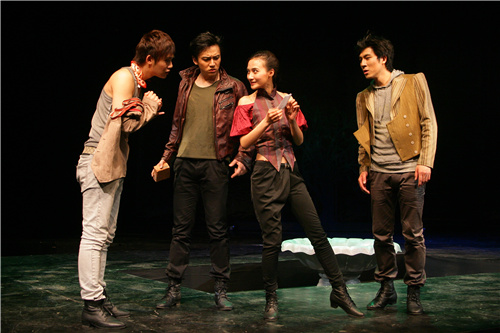
Director: Snejina Tankovska
Playwright: William Shakespeare
Institution: The Central Academy of Drama
Venue: North Theatre
Time: 19:30, May 20, 2011
Event: ATEC 6th International Forum
Director’s Notes
Twelfth Night or, What You Will is one of Shakespeare's "golden comedies". Its style is elegant and with an exquisite humour—a combination of comic lightness, passionate seriousness and lyrical verse; of vivid language and fine tone; of swiftness and compelling rhythm of the action.
But its charm is in the special way the theme of the natural human bent for self-deception is given a comic statement and presented as a romance. It all starts with a storm and a shipwreck, which stir the self-indulgent and static Illyria by the sudden appearance of alienated outsiders. And then the complex plot with its interlocking love stories unfolds into vivid and abundant in variety of mood and colour, rapidly changing action. It binds the characters in a web of errors. The sources of confusion are inexhaustible. It looks like the knot of unexpressed desires, disappointed hope, and emotional bewilderment will never be untangled.
In the Christian Calendar the 12th Night marks the end of the Christmas holidays in early January. During this saturnalia Feast of Misrule duty and convention are ignored. Reversal of roles and unexpected manifestations of various kinds of folly become the order of the day. When the party is over, the normal, everyday life resumes its usual course.
The action of the play takes place on the border territory between the real life and the day-dreamy life during the feast, in the no man's land of disguise, illusion and mistaken identity where the freedom of living on the edge is paid off by the pain and the frustrations of the awakening and of growing up.
The inevitable for the genre happy ending follows a recognition scene and a denouement that provide for some of the characters liberation from their misunderstandings.
Yet," nothing what is so is so"
The charming naivety and carelessness of the characters at the beginning have acquired grotesque and sinister flavour towards the end. Self-centered and egoistical, they will most probably never know the truth about themselves, none of them is changed, nor surrenders his obsessions, they learn nothing from experience, thus must settle for illusion. Amidst the playfulness and the exuberance of the comic situations a bitter sense of sorrow that something went wrong and out of control is getting ever stronger.
From a distance comes a sound of a boat siren like small craft warning.
Synopsis
Twelfth Night, a five-act comedy, was put on stage in 1600-1601. The plot might be an adaptation based on the novel of Cinthio or Bell Forester, describing the love stories of two couples. Sebastian and Viola, a pair of twin brother and sister, are separated in a shipwreck. The sister, under an assumed name of Cesario, is then disguised as a "male servant" of Orsino, the Duke of Illyria. While Cesario (Viola) is sent as Duke Orsino's messenger to propose a marriage to the Lady Olivia, Olivia unexpectedly falls in love with Cesario (Viola) though she has vowed not to marry because both her father and brother died and already refused several proposals of the Duke before. Consequently, there come up a series of misunderstandings and confusion. Since Olivia mistakes Sebastian for Cesario (Viola) and proposes to marry him, Sebastian joyfully agrees, they immediately have a wedding ceremony. As the twin brother and sister reunite, all the misunderstandings are getting untangled. Finally, Viola and the Duke get married. Two pairs of lovers live happily ever after! This Comedy is the representative of Shakespeare's literary works showing his perfect construction of the plot. A lot of themes and ideas found in his previous comedies fully unfold in this play, i.e. roles reversal; woman disguised as a man; proposing a marriage on other's behalf, good things taking time; clown's wit; male friendship; a happy ending; and the unfortunate"outsider",etc.

